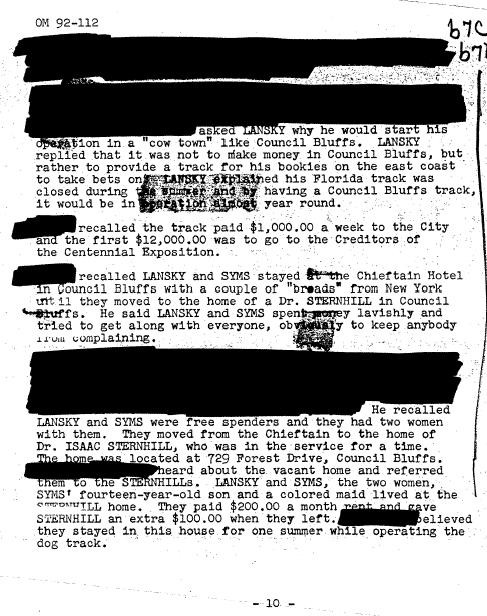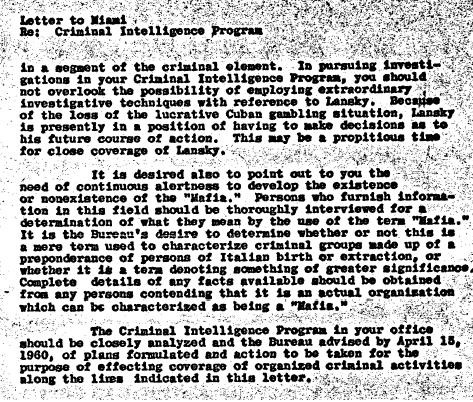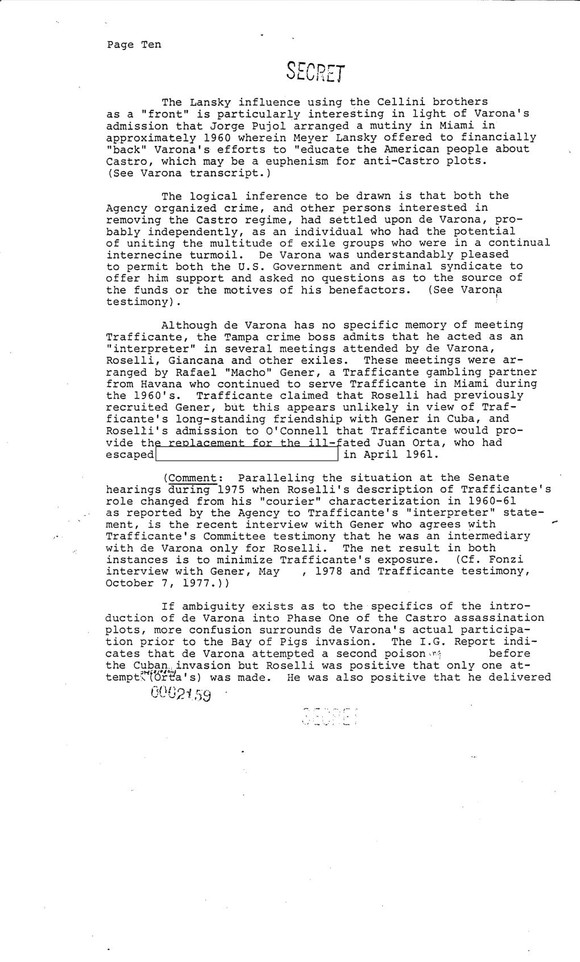Starting from:
$12.95
Meyer Lansky FBI, CIA, and JFK Assassination Records Review Board Files
Meyer Lansky FBI, CIA, and JFK Assassination Records Review Board Files
4,355 pages of material.
Maker Suchowlinski was born to Polish-Jewish parents in Grodno, at that time part of Russian controlled Poland-Lithuania, now Belarus. Majer Suchowlinski would later be known as Meyer Lansky. He moved with his parents to the United States in 1911, where they eventually settled into New York City. In 1920, Lansky met Bugsy Siegel during a fight that occurred when a street corner craps game turned bad. Later in 1920 Lansky met Lucky Luciano. Luciano's gang tried to shakedown Lansky for money and Lansky fought back. This gained Luciano's respect and eventually led to a long illegal partnership. Later the three formed the Five Points Gang.
The implementation of prohibition aided the gang's fortunes. By 1929 they were one of the "Big Seven" bootlegging operations. Lansky is believed to have been instrumental in Luciano's 1931 killing of two New York crime bosses, Joe Masseria and Salvatore Maranzano. These actions elevated Luciano in the crime world. With the passing of the 21st Amendment to the Constitution repealing prohibition in 1933, the economics of the underworld changed. This encouraged former competitors in the world of bootlegging to join to form the "Syndicate." Meyer Lansky and Lucky Luciano were two of the Syndicate's bosses. The Syndicate divided and regulated the illicit markets. Each gang in the syndicate had its own franchise, such as gambling, drugs, or prostitution. One section of the Syndicate enforced the Syndicate's business and was known as "Murder, Inc." For decades the FBI denied the existence of such an organization as the "Syndicate."
By the mid 1930's Lansky held gambling interests in Florida, New York, and Cuba. After Lucky Luciano was expelled from the United States, he delegated his role in the Syndicate to Lansky. This led to Lansky being referred to as "Chairman of the Board of the National Crime Syndicate." Lansky invested in Bugsy Siegel's Las Vegas Flamingo hotel/casino venture. When the venture lost money, other crime bosses became unhappy and suspicious and wanted Siegel killed. Despite Lansky's intervention to prevent it, Bugs Siegel was murdered in 1947. Facing a tax evasion prosecution in the early 1970's, Lansky left the United States for Israel. His attempts to gain Israeli citizenship failed. Lansky was returned to the United States three years later. On January 15, 1983, Meyer Lansky died of lung cancer.
FBI Files
3,407 pages of FBI files covering Meyer Lansky. Files date from 1952 to 1978.
Material covered in the files include: Files showing the FBI efforts to have Meyer Lansky's U.S. citizenship revoked. A report gives a detailed summary of information on Lansky, including background information, family history, education, work history, addresses, business ties, places of amusement and hangouts, and his physical condition. Memos detail Lansky's involvement in dog racing operations. Files show that in 1960 the FBI ramped-up its efforts in going after Lansky. Memos give information obtained from wiretaps and bugs installed in Lansky's Hallendale, Florida home. Files show that the FBI had an informant who would wear a wire while meeting with Lansky. Files contain details of an FBI interview of Meyer Lansky when he returned home from Cuba during the revolution against the Batista regime. Documents chronicle Lansky's attempt to gain citizenship in Israel and the U.S. government's effort to prevent it. Memos detail the incident when Lansky was arrested after being caught at Miami International Airport, after a flight from Mexico, with 154 tablets of the barbiturate Donnatol without a prescription. At trial the judge ordered a directed verdict of not guilty.
JFK Assassination Records Review Board
948 pages of FBI and CIA files that were classified Until October 2017.
The President John F. Kennedy Assassination Records Collection Act of 1992 created the Assassination Records Review Board as an independent agency to re-examine for release the assassination-related records that federal agencies still regarded as too sensitive to open to the public. The Board finished its work on September 30, 1998, issued a final report, and transferred all of its records to the National Archives and Records Administration.
Much of the files deal with Lanksy's gambling operations in Cuba, his connections with Manuel Antonio de Varona y Loredo, Prime Minister of Cuba 1948-1950. VICTOR ESPINOSA, a Cuban exile who lead raids on Cuba in 1963.





4,355 pages of material.
Maker Suchowlinski was born to Polish-Jewish parents in Grodno, at that time part of Russian controlled Poland-Lithuania, now Belarus. Majer Suchowlinski would later be known as Meyer Lansky. He moved with his parents to the United States in 1911, where they eventually settled into New York City. In 1920, Lansky met Bugsy Siegel during a fight that occurred when a street corner craps game turned bad. Later in 1920 Lansky met Lucky Luciano. Luciano's gang tried to shakedown Lansky for money and Lansky fought back. This gained Luciano's respect and eventually led to a long illegal partnership. Later the three formed the Five Points Gang.
The implementation of prohibition aided the gang's fortunes. By 1929 they were one of the "Big Seven" bootlegging operations. Lansky is believed to have been instrumental in Luciano's 1931 killing of two New York crime bosses, Joe Masseria and Salvatore Maranzano. These actions elevated Luciano in the crime world. With the passing of the 21st Amendment to the Constitution repealing prohibition in 1933, the economics of the underworld changed. This encouraged former competitors in the world of bootlegging to join to form the "Syndicate." Meyer Lansky and Lucky Luciano were two of the Syndicate's bosses. The Syndicate divided and regulated the illicit markets. Each gang in the syndicate had its own franchise, such as gambling, drugs, or prostitution. One section of the Syndicate enforced the Syndicate's business and was known as "Murder, Inc." For decades the FBI denied the existence of such an organization as the "Syndicate."
By the mid 1930's Lansky held gambling interests in Florida, New York, and Cuba. After Lucky Luciano was expelled from the United States, he delegated his role in the Syndicate to Lansky. This led to Lansky being referred to as "Chairman of the Board of the National Crime Syndicate." Lansky invested in Bugsy Siegel's Las Vegas Flamingo hotel/casino venture. When the venture lost money, other crime bosses became unhappy and suspicious and wanted Siegel killed. Despite Lansky's intervention to prevent it, Bugs Siegel was murdered in 1947. Facing a tax evasion prosecution in the early 1970's, Lansky left the United States for Israel. His attempts to gain Israeli citizenship failed. Lansky was returned to the United States three years later. On January 15, 1983, Meyer Lansky died of lung cancer.
FBI Files
3,407 pages of FBI files covering Meyer Lansky. Files date from 1952 to 1978.
Material covered in the files include: Files showing the FBI efforts to have Meyer Lansky's U.S. citizenship revoked. A report gives a detailed summary of information on Lansky, including background information, family history, education, work history, addresses, business ties, places of amusement and hangouts, and his physical condition. Memos detail Lansky's involvement in dog racing operations. Files show that in 1960 the FBI ramped-up its efforts in going after Lansky. Memos give information obtained from wiretaps and bugs installed in Lansky's Hallendale, Florida home. Files show that the FBI had an informant who would wear a wire while meeting with Lansky. Files contain details of an FBI interview of Meyer Lansky when he returned home from Cuba during the revolution against the Batista regime. Documents chronicle Lansky's attempt to gain citizenship in Israel and the U.S. government's effort to prevent it. Memos detail the incident when Lansky was arrested after being caught at Miami International Airport, after a flight from Mexico, with 154 tablets of the barbiturate Donnatol without a prescription. At trial the judge ordered a directed verdict of not guilty.
JFK Assassination Records Review Board
948 pages of FBI and CIA files that were classified Until October 2017.
The President John F. Kennedy Assassination Records Collection Act of 1992 created the Assassination Records Review Board as an independent agency to re-examine for release the assassination-related records that federal agencies still regarded as too sensitive to open to the public. The Board finished its work on September 30, 1998, issued a final report, and transferred all of its records to the National Archives and Records Administration.
Much of the files deal with Lanksy's gambling operations in Cuba, his connections with Manuel Antonio de Varona y Loredo, Prime Minister of Cuba 1948-1950. VICTOR ESPINOSA, a Cuban exile who lead raids on Cuba in 1963.





1 file (421.8MB)



